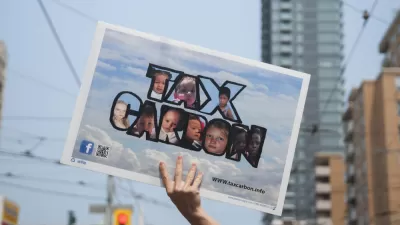Governments must take correction actions to address climate change, warned Pope Francis in his June 18 encyclical, but cap-and-trade, which places a price on carbon emissions but can lead to speculation, is not one of them.
"Pope Francis, in his highly anticipated call to action against climate change, took an unexpected swipe at the cap-and-trade systems used in both California [PDF] and Europe to control greenhouse gases," writes David R. Baker, energy and clean tech reporter for the San Francisco Chronicle. "They may sound good, the pontiff argued. But they won’t work."
“The strategy of buying and selling ‘carbon credits’ can lead to a new form of speculation which would not help reduce the emission of polluting gases worldwide,” Francis wrote in his wide-ranging encyclical on the environment and global warming.
“This system seems to provide a quick and easy solution under the guise of a certain commitment to the environment, but in no way does it allow for the radical change which present circumstances require,” he wrote. “Rather, it may simply become a ploy which permits maintaining the excessive consumption of some countries and sectors."
The pope is not the first to level the "speculation argument" against cap-and-trade. One of the first climate scientists to address climate change, award-winning Dr. James Hansen of NASA's Goddard Institute for Space Studies (now retired), warned that the carbon trading system will "enrich the trading desks of banks, which have a new market to explore" in a 2012 article by Baker posted here.
The Nobel Prize-winning New York Times Op-Ed columnist, Paul Krugman, who supports cap-and-trade, addressed this argument in a 2009 column:
Any time you have a market, there’s some opportunity for speculation. Even if the good being traded isn’t storable, there may be a futures market, so you can bet on the future price.
But he warns that the speculation argument is "not a case of the perfect being the enemy of the good, it’s a case of the perfect being an enemy of the planet."
The alternative to carbon pricing—of which cap-and-trade is one approach, are more regulations. "A smarter way would be to require that all power plants meet a certain standard, create a regulation and force them to meet it, wherever they are,” Kathryn Phillips, the Sierra Club's director for California, told the Chronicle.
Krugman references that approach at the end of his column.
The solution to climate change must rely to an important extent on market mechanisms — it’s too complex an issue to deal with using command-and-control. That means accepting that some people will make money out of trading — and that yes, sometimes trading will go bad. So? We’ve got a planet at stake; it’s crazy to cut off our future to spite Goldman Sachs’s face.
No word on whether the carbon tax would receive the pope's blessing, but I suspect he might be partial to carbon tax and dividend due to the equity aspect as those who benefit the most are those who pollute the least. It did receive Hansen's blessing.
The New York Times indicated that "(c)entral to Francis’ theme is the link between poverty and the planet’s fragility." World Bank President Jim Yong Kim noted the connection between carbon climate change and poverty, and explained that carbon pricing was essential to tackling both in a 2013 PBS NewsHour segment posted here.
Hat tip to Josh Stephens who noted the cap-and-trade exception in his post on the encyclical in the California Planning & Development Report.
FULL STORY: Pope blasts California’s cap-and-trade system

Maui's Vacation Rental Debate Turns Ugly
Verbal attacks, misinformation campaigns and fistfights plague a high-stakes debate to convert thousands of vacation rentals into long-term housing.

Planetizen Federal Action Tracker
A weekly monitor of how Trump’s orders and actions are impacting planners and planning in America.

In Urban Planning, AI Prompting Could be the New Design Thinking
Creativity has long been key to great urban design. What if we see AI as our new creative partner?

King County Supportive Housing Program Offers Hope for Unhoused Residents
The county is taking a ‘Housing First’ approach that prioritizes getting people into housing, then offering wraparound supportive services.

Researchers Use AI to Get Clearer Picture of US Housing
Analysts are using artificial intelligence to supercharge their research by allowing them to comb through data faster. Though these AI tools can be error prone, they save time and housing researchers are optimistic about the future.

Making Shared Micromobility More Inclusive
Cities and shared mobility system operators can do more to include people with disabilities in planning and operations, per a new report.
Urban Design for Planners 1: Software Tools
This six-course series explores essential urban design concepts using open source software and equips planners with the tools they need to participate fully in the urban design process.
Planning for Universal Design
Learn the tools for implementing Universal Design in planning regulations.
planning NEXT
Appalachian Highlands Housing Partners
Mpact (founded as Rail~Volution)
City of Camden Redevelopment Agency
City of Astoria
City of Portland
City of Laramie





























